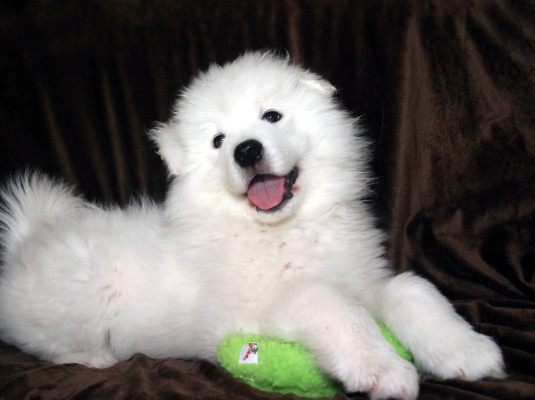Bringing Your Puppy Home

In all the excitement of bringing your new Samoyed puppy home, you will want to consider preparing a safe place for the puppy. A Samoyed puppy is playful and has a natural curiosity to explore and find things that could cause harm. Many puppies have become sick and even died due to injuries received from deadly attractions such as nails, plant leaves, detergents, medicines, anti-freeze (which is sweet tasting), electric cords, chocolate candy, electric appliances, etc. Therefore, it is your responsibility to protect your puppy from any of these dangers. Gates and crates are an excellent way to restrict your puppy and protect it from troublesome situations as well as to start a proper training program.
When you “puppy proof” your home you will be doing almost the same things you would when you baby proof a house. Electrical cords must be hidden or tucked out of sight, plug guards or covers should be place on electrical outlets. Cords from venetian blinds and telephones must be hidden and out of reach.
All household detergents, cleaning agents, medicines, chocolate, chemicals, paints, light bulbs, paper clips, pens, staples, etc, should be unreachable and secured. Also check that doors are not able to be opened by your dog. Many household plants that may seem harmless can be deadly.
It is important to puppy proof the outside of your home as well. Even rocks, as well as all types of balls (i.e., tennis, ping-pong, gold) twigs, etc, can be swallowed and cause deadly intestinal blockage. Outdoor plants such as lilies, bulb plants (i.e. iris, hyacinths, daffodils, etc.) holly and other evergreens are poisonous and should not be in the proximity of your yard where the puppy can chew on them.
Since a Samoyed’s “puppyhood” is the most critical period of its formative life, it is imperative to provide the proper health and nutritional care. The breeder should recommend a proper diet and even provide you with a small amount of food that the puppy has been used to until you can purchase it. Maintaining a consistent diet will safeguard the puppy from stomach upsets due to changes in foods. When making dietary changes, it is always prudent to do it gradually. Overfeeding can also cause digestive problems and affect the health of your puppy. It is best to feed your puppy or dog at the same time every day and to make certain that you provide fresh water at all times.
When you first arrive home, allow the puppy to eliminate outside first. After that, it should be introduced into its new environment – a safe, warm and comfortable place that has been prepared for it, where it can relax and play. In order to reduce its fear of the new surroundings, the puppy should be allowed to sniff and explore its new area, since its new home and surroundings will be strange to it.
During the first few days, avoid overwhelming the puppy with relatives and friends. The puppy should become familiar with each of the family members. Children should be taught how to approach and handle the puppy carefully, to prevent it from becoming frightened or injured. Samoyed puppies are strong and can squirm out of one’s grasp, causing them to be dropped on the ground. It is advisable to have young children be seated when holding a puppy to avoid this.
House training requires some preparation before the new puppy comes home. This would include a safe, clean and secure place where the puppy will be confined. Ideally the room should have a floor that is washable with a surface that is not slippery and should be accessible to the outside. It should be free of dangerous and/or valuable objects. House training is a training period for the new puppy as well as yourself. The most important key to housetraining is for you to become familiar with the puppy’s behavior patterns as soon as possible in order to provide an effective training program.
Even though the puppy is adorable, avoid over handling it. The puppy should be given an appropriate amount of time to socialize, play and relax in order to grow into a healthy and well-adjusted adult dog.
Remember that your breeder should be a great reference and help to you for the life of your Samoyed. Don’t hesitate to contact them with your questions, concerns and of course your celebrations!
As the owner of a Samoyed, you need to make a commitment of your time and energy for the proper grooming, training, attention, and loving care that your puppy/dog requires. Although it may appear that a Samoyed needs more than the average care, the love that you will receive from your Samoyed in return will far outweigh your wildest expectations. Even your friends will respond with amazement at the irresistible beauty, intelligence and uniqueness that is a “Samoyed”.
Bibliography
Ed. Committee, S. C. A. (1998). Living With Your Samoyed. Wright City, MO: Samoyed Club of America.